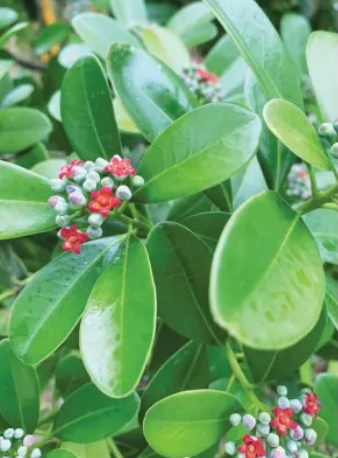March 11, 2024
Class on Florida Native Plants Offered at Edison and Ford Winter Estates
FORT MYERS, Fla. (March 11, 2024) — Edison and Ford Winter Estates will hold a class on Florida native plants, “The Power of Natives in Your Landscape” on Tuesday, March 19 at 1:30 p.m. and Saturday, March 23 at 10 a.m. Anyone wanting to learn about plants that are native to Florida should select from one of the class dates and register in advance.
Most landscapes in Florida feature exotic plants, which are more readily sold at garden centers. Native plants have evolved with butterflies and birds, so they are an important component of gardening for anyone who wants to attract the winged creatures. Many native shrubs produce berries that are eaten by migrating and resident birds, wildflowers produce an abundance of nectar and pollen for pollinators, and some natives produce edible fruit for humans.
Native plants are essential for anyone wanting to start a butterfly garden. Butterflies need both host and nectar plants, and while they often will drink nectar from a variety of plants, they typically require a certain species or plant family as a host. For example, Milkweed is the host for the Monarch, Queen, and Soldier butterflies. While butterflies may flitter through any garden looking for nectar, host plants are required to entice them to take up residence.
Migrating birds expend a lot of energy during the spring and fall migration periods. The birds depend on places to stop and re-fuel, and this is where a

Native Cinnamon Bark
native garden can make a difference for the exhausted birds. Adult birds also depend on native gardens when raising their young. This is another instance where host plants are important. While adult birds enjoy berries and seeds, they rely mostly on caterpillars to feed their young. Baby birds need to eat hundreds of caterpillars. When people plant exotic plants that local caterpillars don’t eat, and spray their yards with pesticides, birds don’t have food for their chicks.
As more people move to Florida, more natural areas are being developed and unfortunately, that equates to lost habitat for birds, butterflies and other wildlife. Luckily, some wildlife stewards, such as Doug Tallamy, are teaching people around the country the importance of planting natives to help offset the extraordinarily large areas of lost habitat.
In Florida, many native plants are endangered because of habitat loss due to development in key areas, such as the Pine Rocklands in Miami and the Sandhill and Scrub habitats of the Lake Wales Ridge. Since birds, insects, plants and other wildlife, such as the Gopher Tortoise all depend on each other for survival, it’s not just the plants that could go extinct.
In addition to teaching how to bring birds and butterflies to a home landscape, this program will also teach how to add native plants to existing gardens, how to incorporate plants in dry and sunny conditions, and which plants enjoy salty breezes. Participants will also get a tour of the native garden areas at the Estates. A copy of the material covered in class, reference sources, and a coupon for 20% off plants from the Garden Shoppe will be provided.
Registration is required online at EdisonFord.org. The class will be held at the Fort Myers-Lee County Garden Council building (the entrance is on Larchmont Avenue, across from the Estates’ overflow parking lots). Participants should wear sunscreen, comfortable shoes and a hat. Class fee is $45 for Edison Ford members and $60 for non-members.
